Books
Books
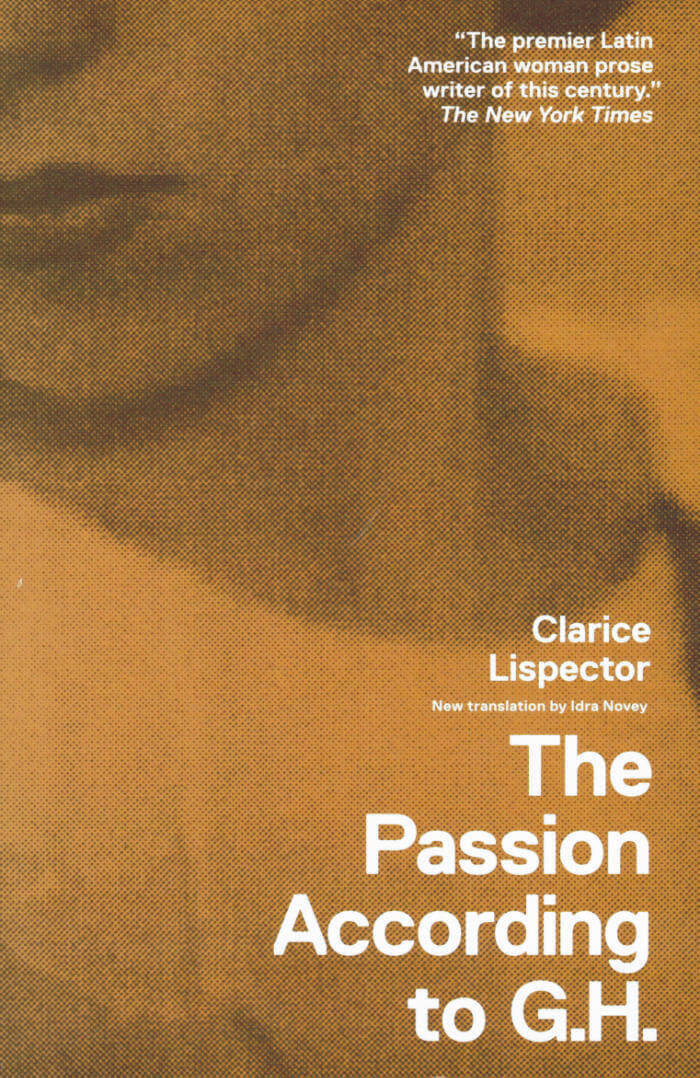
The Passion According to G.H.
The Passion According to G.H., Clarice Lispector's mystical novel of 1964, concerns a well-to-do Rio sculptress, G.H., who enters her maid's room, sees a cockroach crawling out of the wardrobe, and, panicking, slams the door, crushing the cockroach, and then watches it die. At the end of the novel, at the height of a spiritual crisis, comes the most famous and most genuinely shocking scene in Brazilian literature...
Lispector wrote that of all her works this novel was the one that "best corresponded to her demands as a writer."
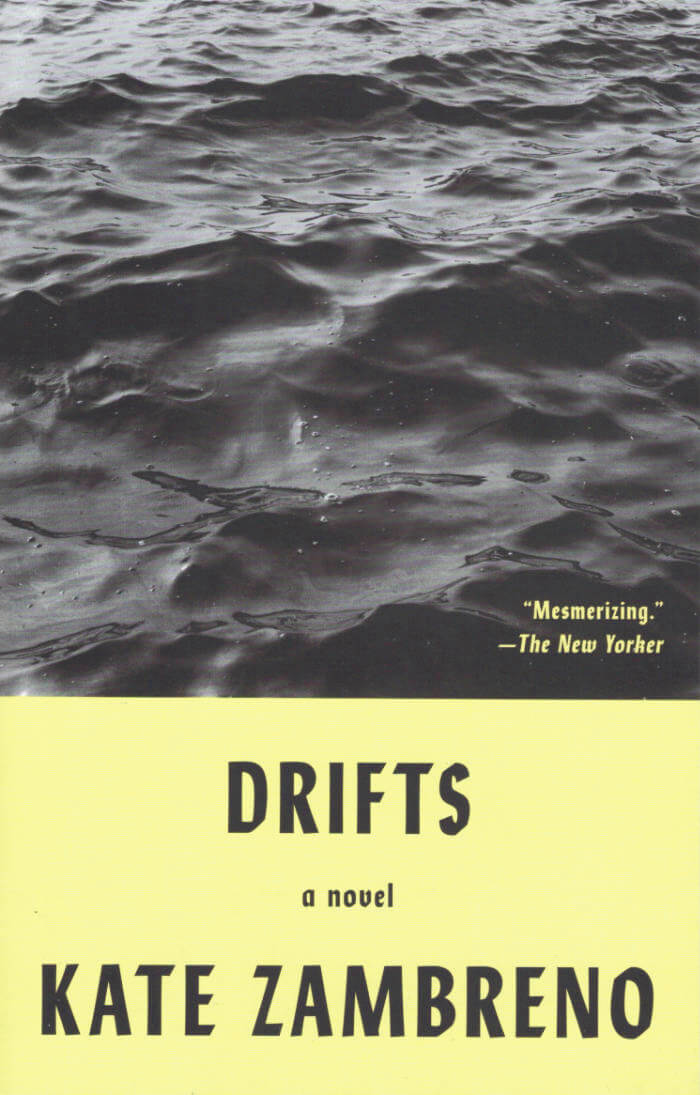
Drifts (paperback)
Haunting and compulsively readable, Drifts is an intimate portrait of reading, writing, and creative obsession. At work on a novel that is overdue, spending long days walking neighborhood streets with her restless terrier, corresponding ardently with fellow writers, the narrator grows obsessed with the challenge of writing the present tense, of capturing time itself. Entranced by the work of Rainer Maria Rilke, Albrecht Dürer, Chantal Akerman, and others, she photographs the residents and strays of her neighborhood, haunts bookstores and galleries, and records her thoughts in a yellow notebook that soon subsumes her work on the novel. As winter closes in, a series of disturbances—the appearances and disappearances of enigmatic figures, the burglary of her apartment—leaves her distracted and uncertain . . . until an intense and tender disruption changes everything.
A story of artistic ambition, personal crisis, and the possibilities and failures of literature, Drifts is the work of an exhilarating and vital writer.
Kate Zambreno is the author of several acclaimed books including Screen Tests, Heroines, and Green Girl. Her writing has appeared in The Paris Review, VQR, and elsewhere. She teaches in the writing programs at Columbia University and Sarah Lawrence College.
Published 2021
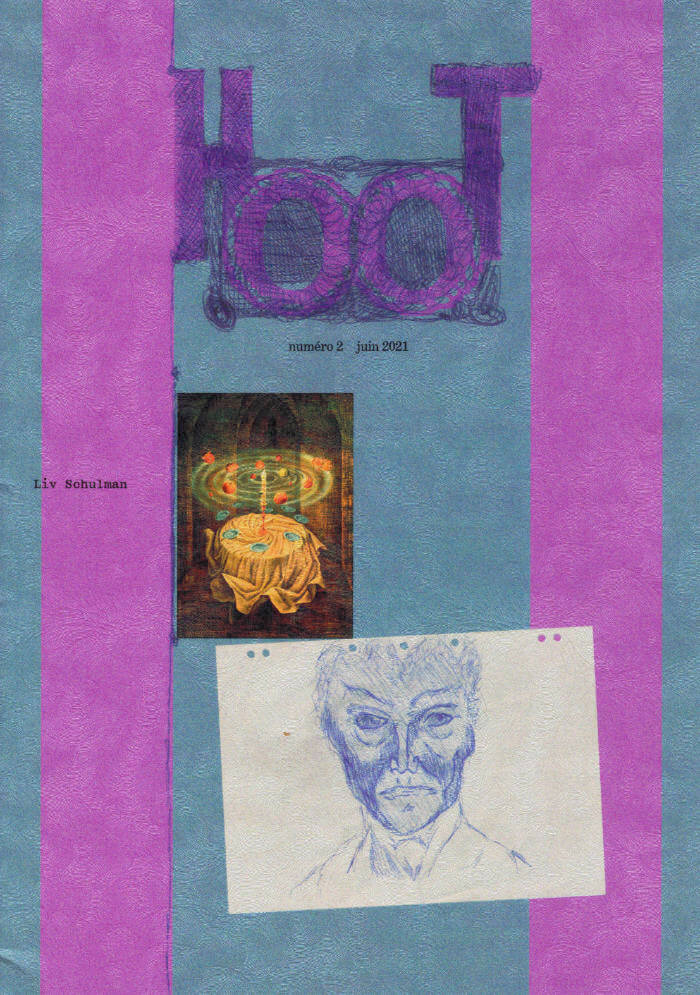
HOOT nr. 2 — Liv Schulman
Gufo, Clément Faydit and 1 more
Nous avons rencontré Liv par écrans interposés, en regardant un épisode de la mini-série « Que Faire ? ». Des phrases en sous titre se collaient à nos pupilles et se fixaient quelque part dans nos souvenirs. Le sous-titrage, comme la transcription d’une conversation, sont deux manières textuelles de traduire des paroles, des oralités, des environnements et des atmosphères. Le sous-titrage est le plus souvent synchrone avec le dialogue, au bas de l’écran ou parfois, comme au Japon, sur le côté. Les transcriptions que vous vous apprêtez à lire, elles, ont déjà eu lieu mais nous pensons que votre lecture les raviveront. Ces textes de paroles traduites s’accompagnent d’images-souvenirs. On se remémore, on oublie et puis on retrouve des archives. On essaie alors d’assembler les éléments, et avec ceux qui manquent, on invente. Parler avec Liv afin de tenter de saisir les silences et les mécaniques spéculatives laissés après la lecture des sous-titres de ses vidéos. Que faire ou plutôt ... comment faire avec ces phrases engluées qui ressurgissent parfois ? « Creativity is the unbearable desire. Is the everyday’s expression of failure » / « It’s not frustration that is revolutionary. It is revolutionarities that get frustrated ».

Buch Livre Libro
The M-Budget book is a publication released on the occasion of the exhibition ‘Tisch Table Tavolo’ by Sophie Nys at Archiv in Zurich.
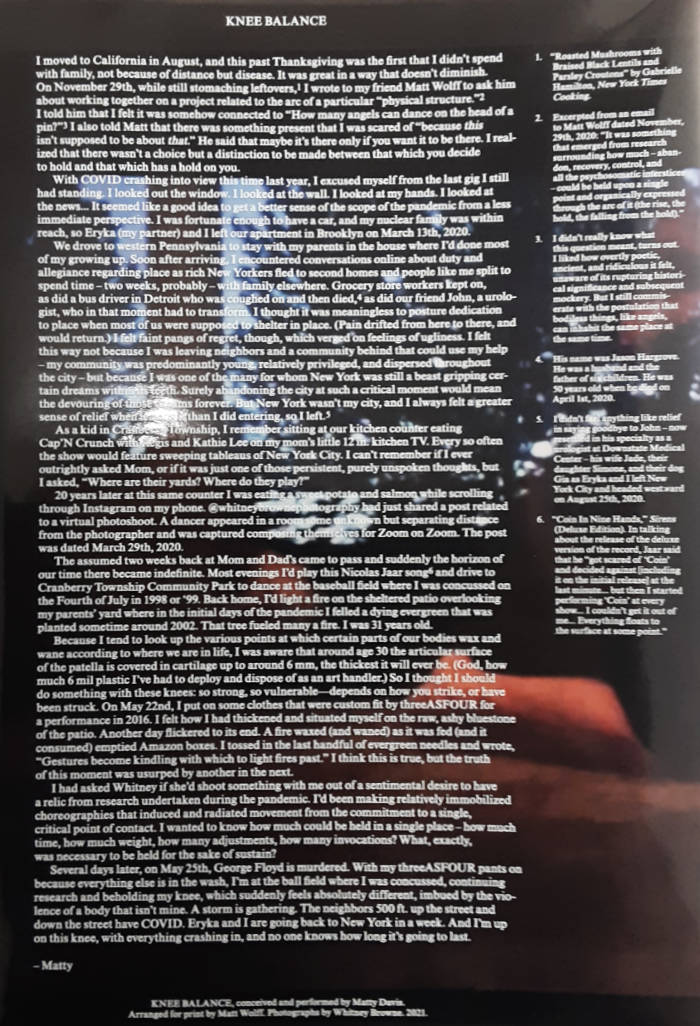
Knee Balance
KNEE BALANCE (2021) is a performance that uses choreography, writing, photography, and design to traverse particular anatomical, personal, and sociopolitical arcs. Time oscillates and fractures movement. Space unfolds. Situated before a hearth in the throes of balance, the performer becomes a crucible for memory, durability, and the reciprocal relationship between the present and the unforeseen.
Comes nested inside ad hoc polyvinyl sleeve with text by Matty Davis printed on front
This work marks the first in a series of performances by Matty Davis arranged for print by Matt Wolff. Distinct in content and form, each work weaves psychosomatic realities with the spatial and temporal possibilities of print.
Vital contributions have been made to this series of performances by artists including Will Arbery, Whitney Browne, Mark Davis, Eryka Dellenbach, Nile Harris, Jonah Rosenberg, Holly Sass, Matt Shalzi, and Bobbi Jene Smith.
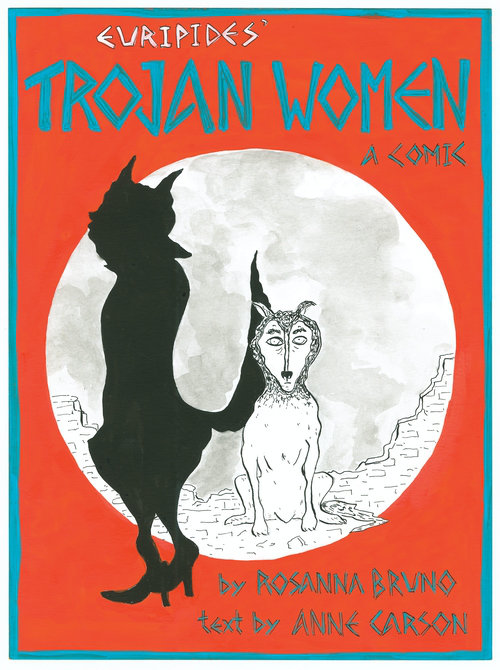
The Trojan Women
A fantastic comic-book collaboration between the artist Rosanna Bruno and the poet Anne Carson, based on Euripides’s famous tragedy.
The Trojan Women, follows the fates of Hekabe, Andromache, and Kassandra after Troy has been sacked and all its men killed. This collaboration between the visual artist Rosanna Bruno and the poet and classicist Anne Carson attempts to give a genuine representation of how human beings are affected by warfare. Therefore, all the characters take the form of animals (except Kassandra, whose mind is in another world).

Last Utopia
The bilingual book (NL-EN) contains one chapter of her recent novel Exces (Prometheus, 2021), which she has been working on during her stay at the academy. Set in the rave scene of 90s' Berlin, Last Utopia sketches the emotional landscape of an era that was supposed to be liberated, a time when the future was ostentatiously hailed. Yet in between the markers of optimism and progress, the first cracks announcing the permanent crises of today are revealed. Understanding techno as narrative device, this short novella - which can be read independently from the novel - traces echoes of utopian imaginary.
Persis Bekkering is a sophisticated maker of scenes, her prose is strongly physical and immersive. In her work, human relations are scrutinized and exposed in its ambiguity. In 2018 she published her first novel, Een heldenleven (Life of a Hero) with Prometheus, which was shortlisted for the ANV Debut Prize. She writes essays, art - and literary criticism and columns, for Mister Motley, NRC Handelsblad and other publications. An excerpt of Last Utopia was used as libretto for Stine Janvin and Ula Sickle's concert performance Echoic Choir, which premiered at the Wiener Festwochen.

Alas
First published in 1759, Laurence Sterne’s ‘The Life and Opinions of Tristram Shandy’ is widely considered a revolutionary novel, and its style is marked by digression, double entendre, and graphic devices.
In ‘Alas, artist Sophie Nys obsesses about one of these devices, the so-called black page, famously paired with the line, “Alas, poor Yorick!” She compiles a remarkable collection of black pages, all gathered from more than 100 different editions of Sterne’s book.
Included is a text by Peter de Voogd, the collector and owner of the library from which all the images in this publication originate, on the technical challenges that printing a black page presented for these early editions.

Vernon Subutex 3
As storm clouds gather, portending a final reckoning, ersatz rave-cult leader Vernon Subutex decides to return to Paris. Even if it means leaving behind his disciples. He has to. He’s got a dentist’s appointment.
Back in the city, he learns that an old friend from his days homeless on the Paris streets has died and left him half of a lottery win. But when Vernon returns to his commune with news of this windfall, it’s not long before his disciples turn on each other. Such good fortune does not accord with the principles Vernon has handed down.
Meanwhile, the monstrous film producer Laurent Dopalet is determined to make Aïcha and Céleste pay for their attack on him, whatever it takes and whoever gets hurt. And, before long, the whole of Paris will be reeling in the wake of the terrorist atrocities of 2015 and 2016, and all the characters in this kaleidoscopic portrait of a city and era will be forced to confront one another one last time. In the wake of all this chaos and hate, the question will rise again: After all he’s been through, who is Vernon Subutex? And the answer: He is the future.
Virginie Despentes’s epochal trilogy ends with Vernon Subutex 3—in fire, blood, and even forgiveness. But not everyone will survive to see the dawning of the golden age of Subutex.
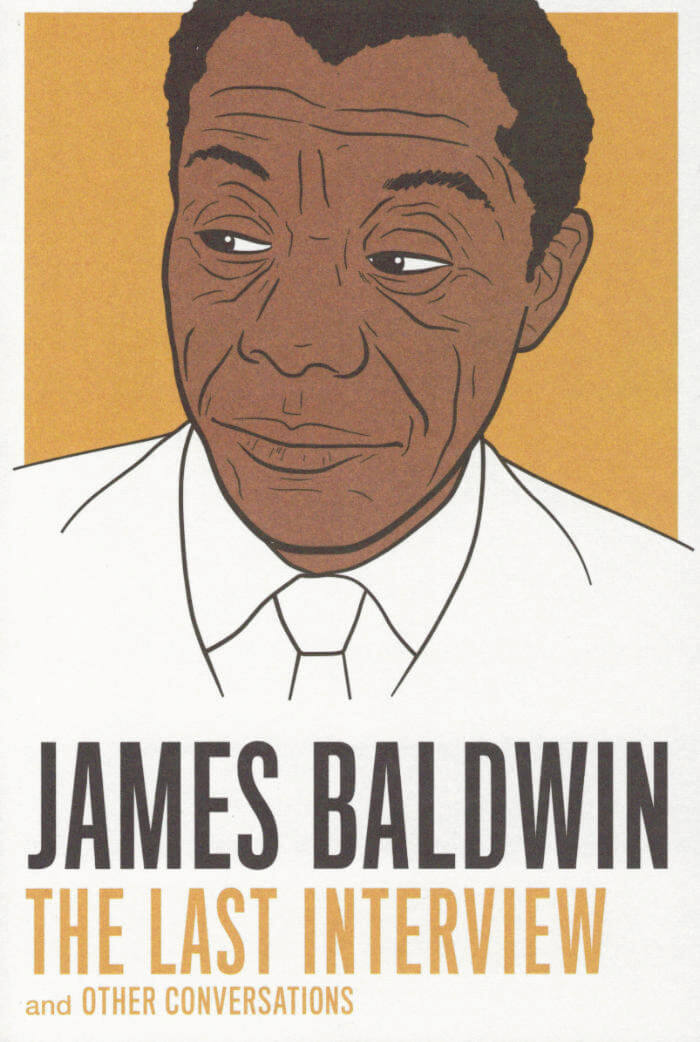
James Baldwin: The Last Interview: And Other Conversations
Never before available, the unexpurgated last interview with James Baldwin.
“I was not born to be what someone said I was. I was not born to be defined by someone else, but by myself, and myself only.” When, in the fall of 1987, the poet Quincy Troupe traveled to the south of France to interview James Baldwin, Baldwin’s brother David told him to ask Baldwin about everything—Baldwin was critically ill and David knew that this might be the writer’s last chance to speak at length about his life and work.
The result is one of the most eloquent and revelatory interviews of Baldwin’s career, a conversation that ranges widely over such topics as his childhood in Harlem, his close friendship with Miles Davis, his relationship with writers like Toni Morrison and Richard Wright, his years in France, and his ever-incisive thoughts on the history of race relations and the African-American experience.
Also collected here are significant interviews from other moments in Baldwin’s life, including an in-depth interview conducted by Studs Terkel shortly after the publication of Nobody Knows My Name. These interviews showcase, above all, Baldwin’s fearlessness and integrity as a writer, thinker, and individual, as well as the profound struggles he faced along the way.

Something Like A Phenomenon
First monograph of artist Sharon Van Overmeiren, published by Damien & The Love Guru (2021).
Sharon Van Overmeiren (°1985, Antwerp, Belgium) recently completed the Residency Programme in Jan Van Eyck Academie, a multiform institute for fine art, design and reflection in Maastricht. Her research focuses on the significance and the common lineage of objects displayed in various compositions, in particular the relationship and intersection between objects and their natural, metaphysical expression.
Book design by Hagen Verleger.
With a guiding soundtrack / usb card by Elko Blijweertd.

We are not where we need to be, but we ain't where we were.
Tiphanie Blanc, Lili Reynaud-Dewar and 1 more
We are not where we need to be but, we ain't where we were is the first volume of a new series of publications by the collective Wages For Wages Against that reports on active research engaged within the artistic professions and institutions since 2017. Its aim is to question the underlying neoliberal logics in the contemporary art world, by orienting our object of study towards the struggles that impact it. With this publication, our hope is to put into practice various values specific to the campaign: the existence of a systematic and fair remuneration, a desire for transparency, the sharing of knowledge, and the visibilization of demands proper to the field of the visual arts and concomitant struggles. It is the result of militant experiences, at the convergence of our individual experiences and collective questionings.
With texts by Tiphanie Blanc, Antonella Corsani, Fanny Lallart, Lili Reynaud-Dewar, Ramaya Tegegne and an interview with Outrage Collectif.

On Immunity: An Inoculation
Upon becoming a new mother, Eula Biss addresses a chronic condition of fear: fear of the government, the medical establishment, and what is in children's food, mattresses, medicines, and vaccines. Biss investigates the metaphors and myths surrounding the conception of immunity and its implications for the individual and the social body. As she hears more and more fears about vaccines, Biss researches what they mean for her own child, her immediate community, America, and the world.
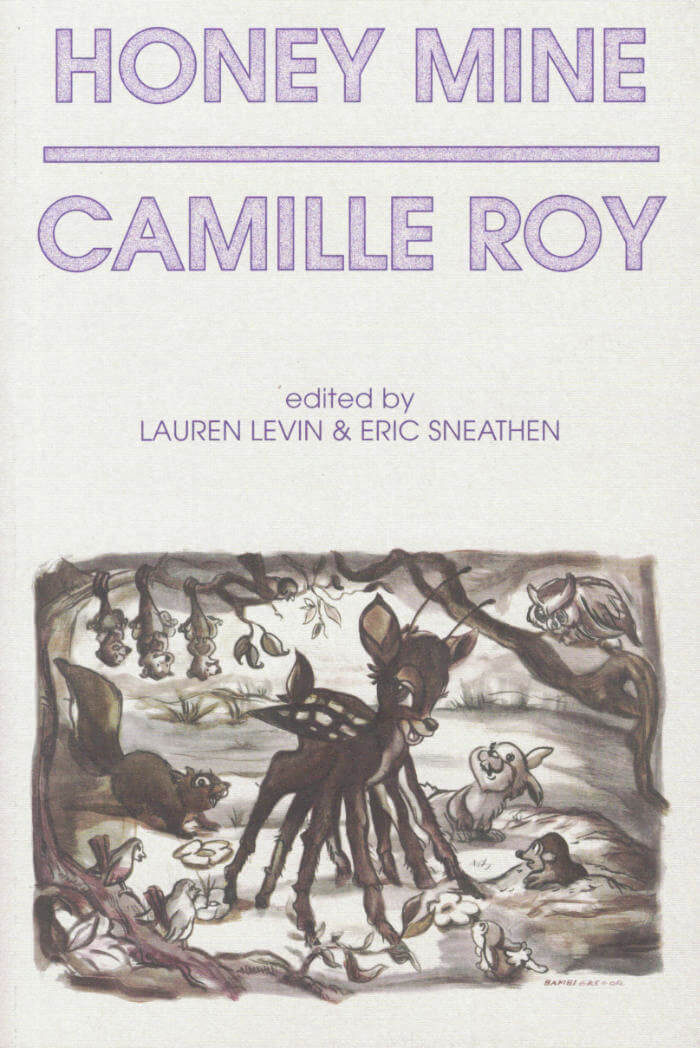
Honey Mine: Collected Stories
Honey Mine unfolds as both excavation and romp, an adventure story that ushers readers into a lesbian writer's coming of age through disorienting, unsparing, and exhilarating encounters with sex, gender, and distinctly American realities of race and class. From childhood in Chicago's South Side to youth in the lesbian underground, Roy's politics find joyful and transgressive expression in the liberatory potential of subculture. Find here, in these new, uncollected and out-of-print fictions by a master of New Narrative, a record of survival and thriving under conditions of danger.

Sterling Karat Gold
Sterling is arrested one morning without having done anything wrong. Plunged into a terrifying and nonsensical world, Sterling – with the help of their three best friends – must defy bullfighters, football players and spaceships in order to exonerate themselves and to hold the powers that be to account.
Sterling Karat Gold is Kafka’s The Trial written for the era of gaslighting – a surreal inquiry into the real effects of state violence on gender-nonconforming, working-class and black bodies.
Following the Goldsmiths Prize–nominated We Are Made of Diamond Stuff, Isabel Waidner’s latest novel proposes community, inventiveness and the stubborn refusal to lie low as antidotes against marginalisation and towards better futures.

The Waterfront Journals
A visceral and carnivalesque mosaic of life at the fringes.
The Waterfront Journals is a road trip through the sensuous, perilous landscape of alternative America—a series of fictional monologues that ventriloquise the real people Wojnarowicz met on his travels while he was sleeping rough.
We meet these hustlers, runaways and dreamers in unassuming locations—in truck stops, bus stations and parks. Their stories are disturbing, often shocking; but they’re told with an honesty and a hallucinatory intensity that simply demands to be heard.
Published for the first time in the UK, this electrifying collection confirms that David Wojnarowicz was not only one of millennial America’s most necessary and visionary artists, but also among its most humane and urgent literary chroniclers.
Praise for The Waterfront Journals
A totally crucial book by one of the 20th century’s greatest artists and writers.—Maggie Nelson
Wojnarowicz proves that the difference between the rules of poverty and those of a dream is nothing more than smoke. The termination point of American life examined by the terminal American artist.—Jarett Kobek

Men and Apparitions
MEET EZEKIEL HOOPER STARK, cultural anthropologist and bemused commentator on the contemporary world. Zeke has carved out an academic career studying family photographs, gender and images. Meanwhile – now 38 – he still contends with his own family’s perversities and pathologies, which charge his chaotic love life.
While living in London, Zeke finds himself spiralling into crisis. As the centre ceases to hold, so too does any pretence of his having a dispassionate, purely academic interest in these issues.
Zeke finds a new research topic: himself. He embarks on a quixotic new project, studying the ‘New Man’, born under the sign of feminism. What, he asks his male subjects, does masculinity mean today, in a world in which all the old models are broken? What do you expect from women? What do you expect from yourself? Meanwhile, what will the reader make of Zeke – is he enlightened or misguided, chauvinistic or simply delusional?
Kaleidoscopic and encyclopaedic, comic, tragic, and philosophical, Men and Apparitions showcases Lynne Tillman not only as a unique novelist but also as one of our most important contemporary thinkers on art, culture and the politics of gender.
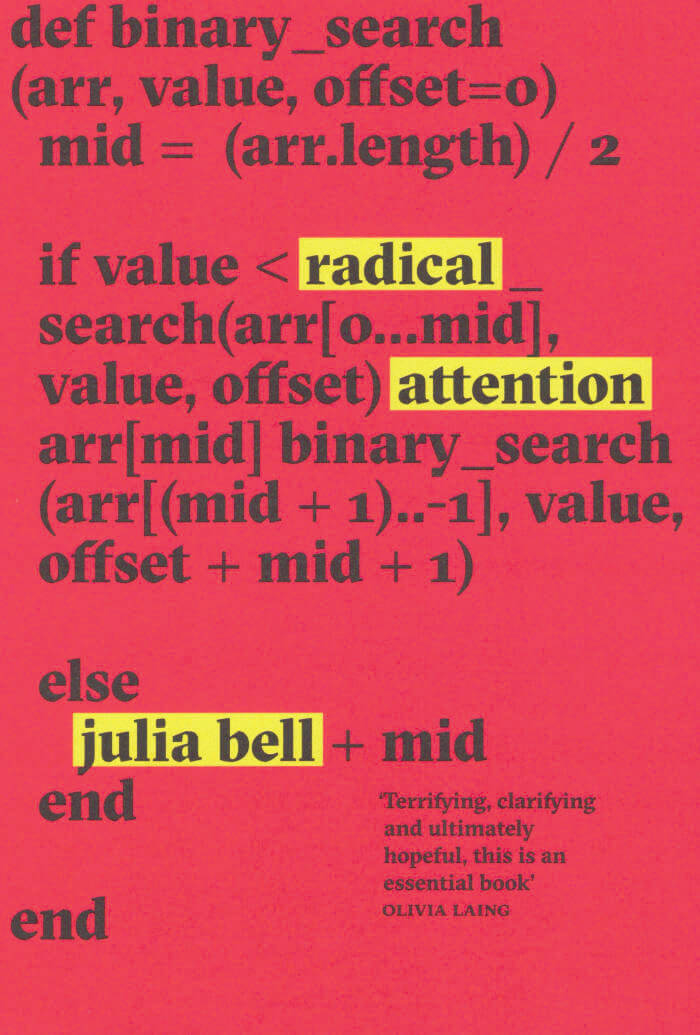
Radical Attention
An essay on the battle for our attention in the age of distraction.
Attention pays. In today‘s online economy it has become a commodity to be bought and sold. Bombarding us with free smartphone apps and news websites, developers and advertisers have turned what and how focus our attention into the world‘s fastest growing industry.
In exchange for our attention, information and entertainment is ever at our fingertips. But at what cost? In this essay, at once personal and polemical, meditative and militant, Julia Bell asks what has been lost in this trade off. How can we reclaim our attention? In a world of infinite distraction, how can attention become radical?
Praise for Radical Attention
‘Terrifying, clarifying and ultimately hopeful, this is an essential book. Julia Bell grapples with the grim realities of our online lives, setting out possibilities for resisting and reclaiming our imperilled freedoms.’ — Olivia Laing

Conflict Is Not Abuse
From intimate relationships to global politics, Sarah Schulman observes a continuum: that inflated accusations of harm are used to avoid accountability. Illuminating the difference between Conflict and Abuse, Schulman directly addresses our contemporary culture of scapegoating. This deep, brave, and bold work reveals how punishment replaces personal and collective self-criticism, and shows why difference is so often used to justify cruelty and shunning.
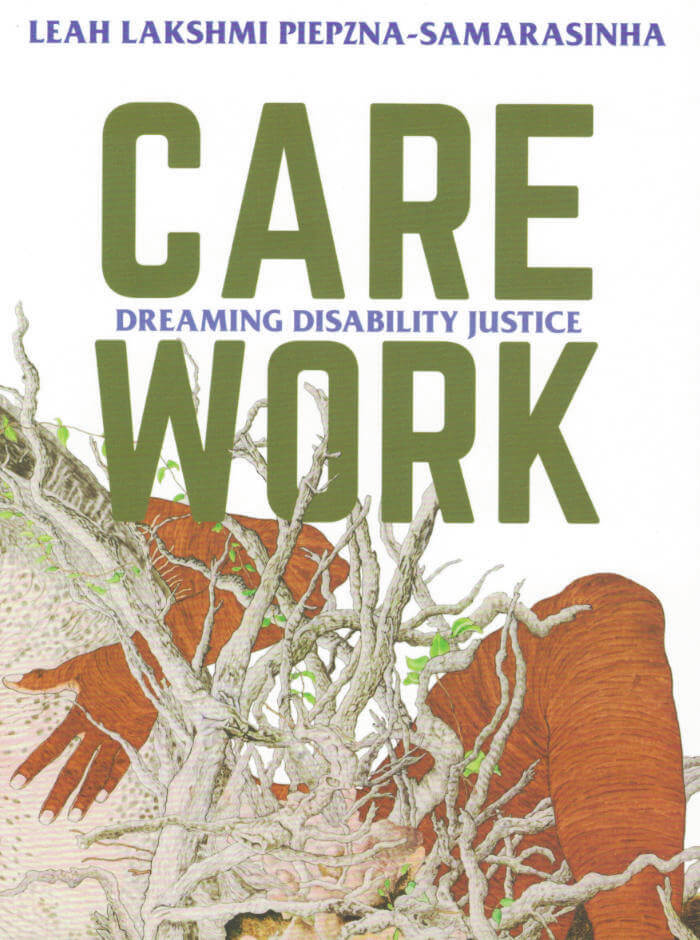
Care Work
Leah Lakshmi Piepzna-Samarasinha
Lambda Literary Award winning poet and essayist and long-time disability justice advocate Leah Piepzna-Samarasinha writes passionately and personally about disability justice in her latest book of essays. Discussing subjects such as the creation of care webs, collective access, and radically accessible spaces, she also imparts her own survivor skills and wisdom based on her years of activist work, empowering the disabled - in particular, those in queer and/or BIPOC communities - and granting them the necessary tools by which they can imagine a future where no one is left behind.
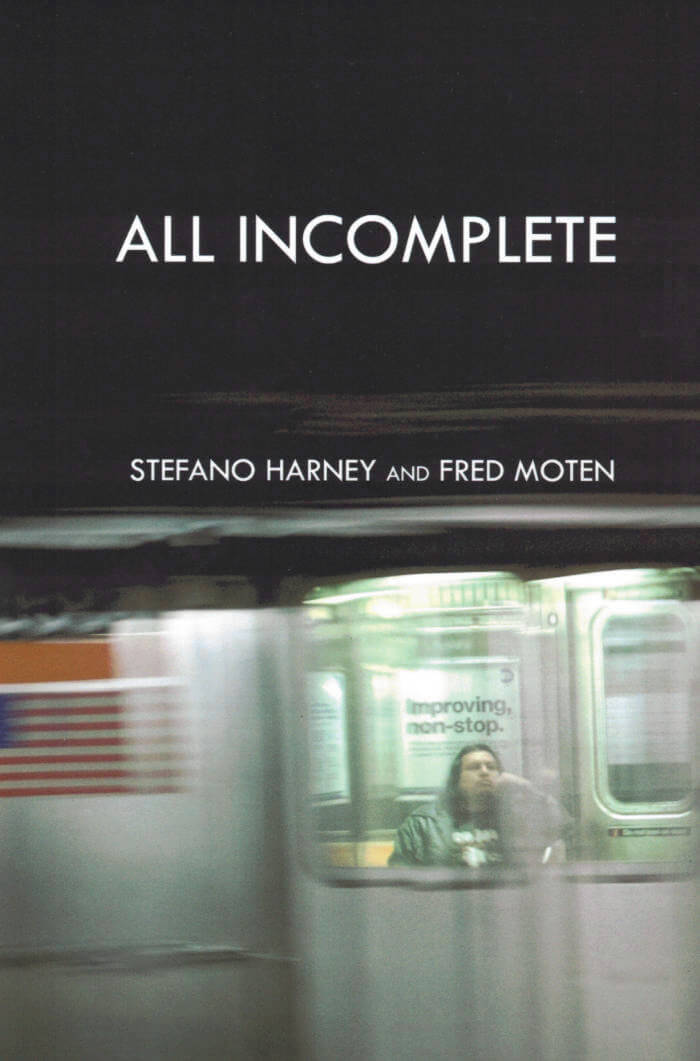
All Incomplete
Building on the ideas Harney and Moten developed in The Undercommons, All Incomplete extends the critical investigation of logistics, individuation and sovereignty. It reflects their chances to travel, listen and deepen their commitment to and claim upon partiality. All Incomplete studies the history of a preference for the force and ground and underground of social existence.
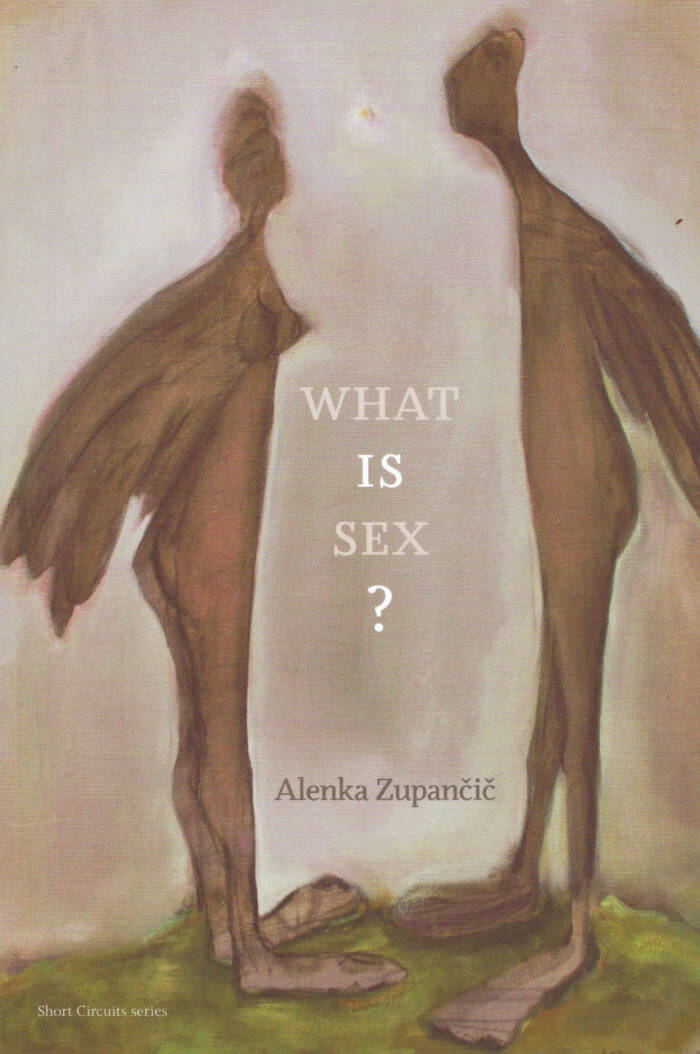
What Is Sex?
Why sexuality is at the point of a "short circuit" between ontology and epistemology.
Consider sublimation, conventionally understood as a substitute satisfaction for missing sexual satisfaction. But what if, as Lacan claims, we can get exactly the same satisfaction that we get from sex from talking (or writing, painting, praying, or other activities)? The point is not to explain the satisfaction from talking by pointing to its sexual origin, but that the satisfaction from talking is itself sexual. The satisfaction from talking contains a key to sexual satisfaction (and not the other way around), even a key to sexuality itself and its inherent contradictions. The Lacanian perspective would make the answer to the simple-seeming question, "What is sex?" rather more complex. In this volume in the Short Circuits series, Alenka Zupančič approaches the question from just this perspective, considering sexuality a properly philosophical problem for psychoanalysis; and by psychoanalysis, she means that of Freud and Lacan, not that of the kind of clinician practitioners called by Lacan "orthopedists of the unconscious."
Zupančič argues that sexuality is at the point of a "short circuit" between ontology and epistemology. Sexuality and knowledge are structured around a fundamental negativity, which unites them at the point of the unconscious. The unconscious (as linked to sexuality) is the concept of an inherent link between being and knowledge in their very negativity.
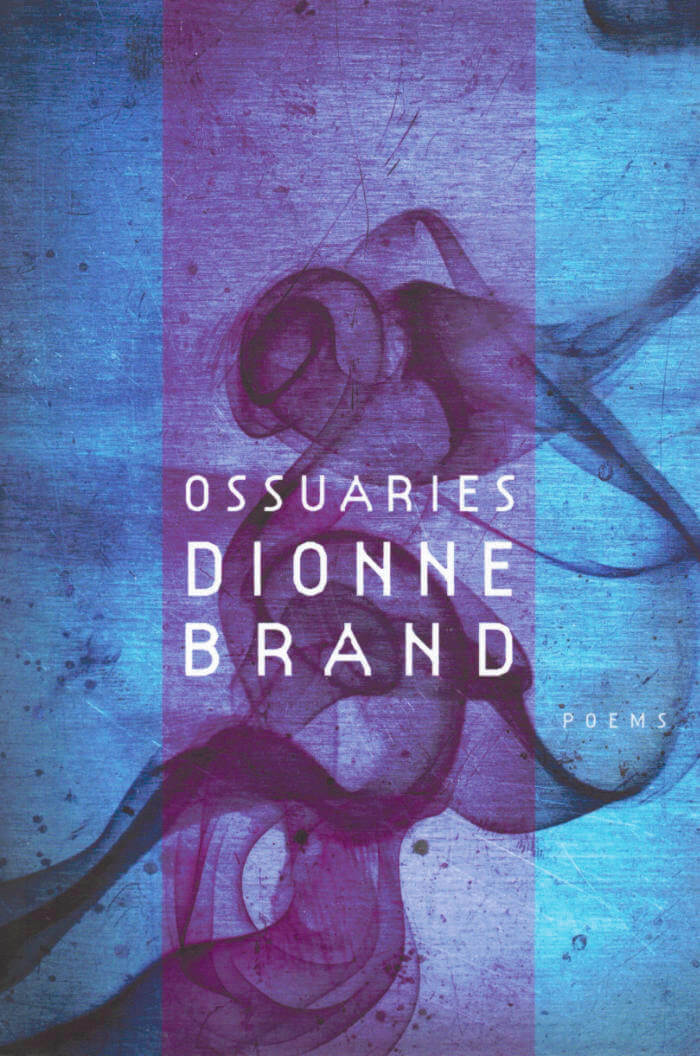
Ossuaries
Dionne Brand's hypnotic, urgent long poem is about the bones of fading cultures and ideas, about the living museums of spectacle where these bones are found. At the centre of Ossuaries is the narrative of Yasmine, a woman living an underground life, fleeing from past actions and regrets, in a perpetual state of movement. She leads a solitary clandestine life, crossing borders actual (Algiers, Cuba, Canada), and timeless. Cold-eyed and cynical, she contemplates the periodic crises of the contemporary world.
A work of deep engagement, sensuality, and ultimate craft from an essential observer of our time and one of the most accomplished poets writing today.

HOOT nr. 1 — Fanny Lallart
Gufo, Clément Faydit and 1 more
Dans ce numéro, nous avons échangé et discuté des pratiques de Fanny Lallart, de la revue SHOW, d'autonomie, de visibilité, de feinte, d'amitié, d'écriture et de travail.
Gufo a rencontré Fanny après qu’elle ait déposé quelques revues SHOW à Giselle’s Books, une bibliothèque indépendante à Marseille. Nous nous sommes retrouvé·e·s au parc Longchamp et puis iel lui a proposé de participer à la revue pour le mois de mai. Iel a attendu quelques jours sa réponse et nous avons convenu d’un rendez vous en visio pour une première conversation: Marseille – Montreuil. Nous avons enlevé les caméras après s’être vu·e·s et nous avons commencé à échanger. Il était 18 ou 19 heures, le soleil s’est couché et nous avons raccroché. Nous nous sommes rappelé·e·s, il fallait revenir sur certains points abordés, les détailler et en démasquer d’autres. Fanny n’était plus à Montreuil mais chez des ami·e·s plus au sud; il y avait une montagne, parfois un peu de vent, c’était peut-être les Cévennes. Notre dernière rencontre s’est faite à Marseille, irl. Fanny nous a apporté un Cash, un jeu de loterie à gratter mais nous avons perdu.
HOOT est une conversation imprimée, une relation orale retranscrite avec un·e travailleur·se du champ de l’art, un·e collectif·ve autour de la notion de travail en tant qu’activité, méthode, environnement, milieu, symbole et nécessité. Chaque mois, entre le 1 et le 31, qu’il s’agisse d’un mercredi ou d’un dimanche, HOOT propose à ses lecteurs·rices, une discussion que nous espérons passionnée, à bouches déliées. Chaque numéro sera retranscrit selon la langue utilisée et partagée lors de la conversation.
HOOT est une revue mensuelle initiée par Gufo, Clément Faydit et Rozenn Voyer.